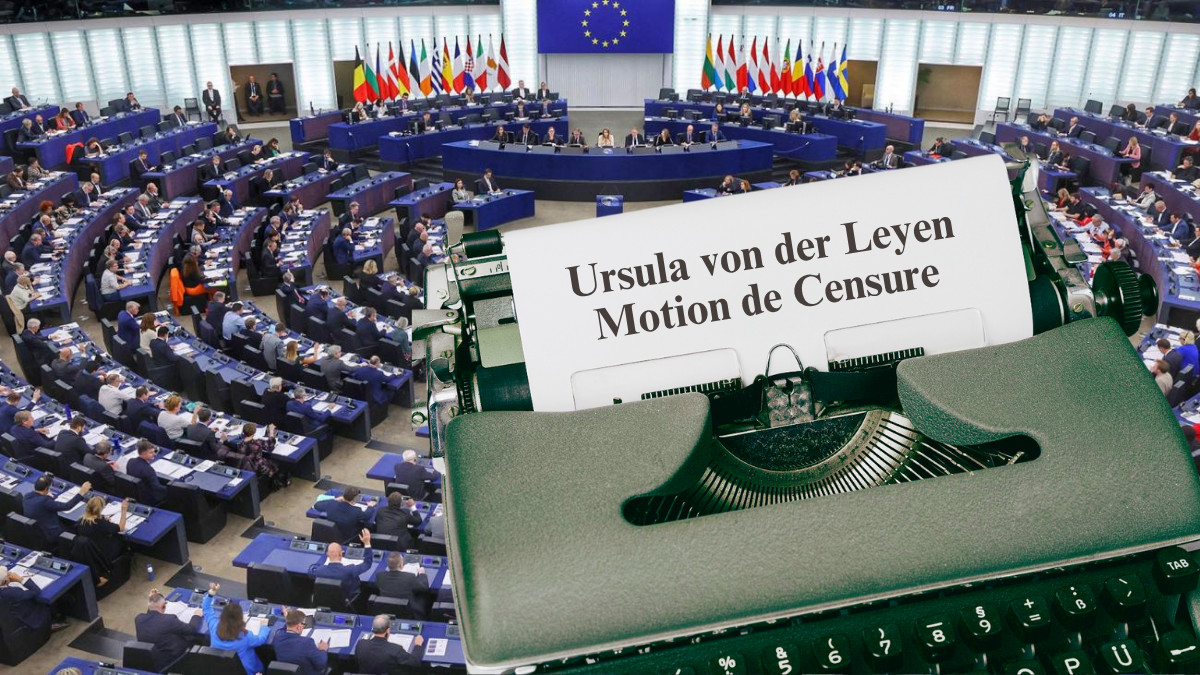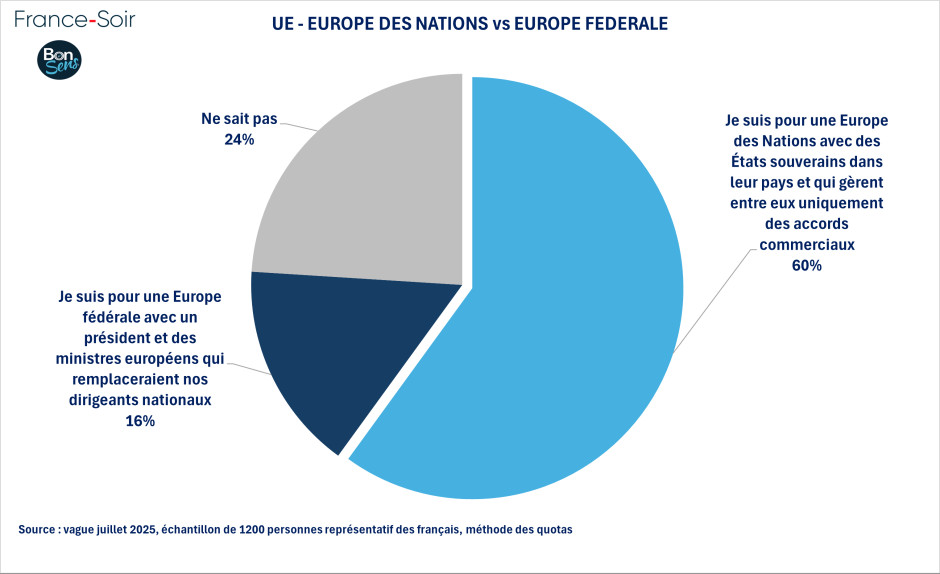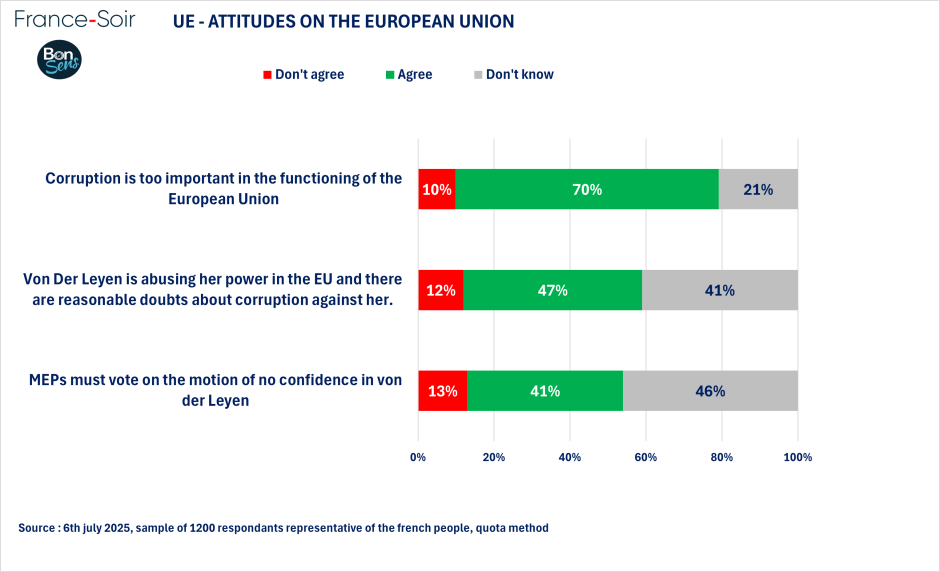Xavier Azalbert, France-Soir
Motion of censure against Ursula von der Leyen: a real crisis of confidence at the heart of Europe
AFP, France-Soir
Summary: On July 7, 2025, a motion of censure against Ursula von der Leyen, President of the European Commission, shook the European Parliament. Led by Gheorghe Piperea and 76 MEPs, this initiative, debated in plenary session and put to a vote this Thursday, reflects explosive public distrust.Piperea denounces three scandals: irregularities in the €650 billion recovery fund, the opaqueness of text messages exchanged with Pfizer's CEO, and dubious NGO funding for the Green Deal. "Transparency is essential", he insists, accusing von der Leyen of "contempt for institutions". Former ombudsman Emily O'Reilly compares the Commission to a "mafia."However, and surprisingly, this motion does not address more serious elements: accused of corruption and opaqueness, von der Leyen is the subject of a criminal complaint in Belgium (1,000+ complainants, including Poland and Hungary) for her handling of the €35 billion Pfizer contracts, which are still hidden, and of an EPPO investigation. Prosecutor Laura Kovesi is herself under fire for obstruction.
MEPs are divided. Friedrich Pürner (Germany) supports the motion, castigating the inaction on the Pfizer affair: "They don't respect justice". Fernand Kartheiser (Luxembourg) demands "total transparency" on COVID. Petr Bystron (AfD) denounces a "caste of untouchables,"while Marc Jongen (AfD) speaks of a "flagrant lack of responsibility."Valérie Hayer, a fragile ally, urges von der Leyen to "take back control"for a pro-European agenda, revealing a fracture even among supporters. The major groups (Greens, EPP) dodge, citing busy schedules.
In France, 71% of citizens consider the EU corrupt, 64% want a "Europe of Nations", and 41% support the motion (MIS Group poll). In Germany, 70% of citizens in Eastern Europe share this distrust. If the motion fails, pro-nomination MEPs could intensify legal action, given Pfizer contracts remain secret and a Commission perceived as untouchable. This vote, a crucial test for European democracy, could either restore trust or widen an irreparable divide between the EU and its citizens.
*** article ***
On July 7, 2025, at 5 p.m., the European Parliament opened a plenary discussion on a motion of censure targeting Ursula von der Leyen, President of the European Commission. Initiated by Romanian MEP Gheorghe Piperea and supported by 76 other parliamentarians, this motion, which will be put to a vote this Thursday, reflects growing discontent among European citizens with von der Leyen's management. This movement, relayed by France-Soir in an interview with Piperea, comes at a time marked by serious accusations against von der Leyen, including a criminal investigation in Belgium involving more than 1,000 complainants, including Poland and Hungary, and an investigation by the European Anti-Fraud Office (EPPO). Here is a detailed analysis of the issues, the reasons, the responses of MEPs and the implications for the future of the European Union.
Growing distrust
The motion of censure, the first since the fall of the Santer Commission in 1999 for mismanagement, is based on accusations far more serious than those aimed at the Santer Commission. Former European Ombudsman Emily O'Reilly described the von der Leyen Commission as "mafia-like", reinforcing suspicions of corruption. In France, a MIS Group poll for France-Soir/Bonsens.org (July 6, 2025) found that 70% of French people believe corruption is a major problem in the EU.
The reasons for the motion of censure
Gheorghe Piperea, a Romanian lawyer and professor, detailed three main grievances in his speech:
- Financial irregularities : A report by the European Court of Auditors highlights anomalies in the use of the €650 billion Recovery and Resilience Facility. Piperea states: "Auditors have raised suspicions of corruption. Transparency and respect for the rule of law in the management of public funds are essential."
- Pfizer Contract Opacity : The European Court of Justice ruled on May 14 that the European Commission should have responded to requests for transparency from journalists and citizen groups like BonSens.org, which wanted access to text messages exchanged between von der Leyen and Pfizer CEO Albert Bourla during the COVID-19 vaccine procurement contract negotiations. Piperea emphasized: "It is unusual to negotiate via text message for a €35 billion contract. The lack of disclosure is deeply concerning."
- Questionable NGO funding : Piperea denounces the Commission's funding of certain NGOs to promote the Green Deal, calling these transactions "corrupt". It adds: "These actions reflect a lack of ethics and transparency."
Piperea also criticizes von der Leyen's overall management, accusing him of "contempt for institutions" and violating the principles of the separation of powers. "This sets a bad example for citizens", he says, while rejecting accusations of extremism: "I am not an extremist, I am a committed lawyer and professor". He sees this motion as a "strong signal" to restore transparency, even if it is rejected.
MEPs' responses: marked polarization
France-Soir contacted all 720 MEPs to gather their views on the motion, citizens' concerns, and transparency issues. Here is a summary of the responses received, with key quotes to illustrate their points of view:
- Friedrich Pürner (Non-attached, Germany) supports the motion: "In Germany, citizens are concerned about the lack of transparency and the misuse of European funds."He criticizes the Commission's inaction in the Pfizer case: "They are not respecting the court ruling". Pürner will vote in favor, seeing an opportunity to "restore democratic control".
- Fernand Kartheiser (Non-attached Member, Luxembourg) seconded the motion, noting limited trust in von der Leyen in Luxembourg: "People remember that she made text messages disappear in Germany". He will vote against the Commission to demand "full transparency on the COVID file" and stop interference in member states.
- Petr Bystron (AfD/ESN, Germany) denounced a "caste of untouchables": "The unelected commissioners show contempt for Parliament". He supported the motion, saying: "His resignation is the first step in reclaiming Europe from corrupt bureaucrats". He criticized the opacity of vaccine contracts and links with NGOs.
- Marc Jongen (AfD/ESN, Germany) will vote in favour: "Her term in office is marked by a lack of transparency and a disregard for democratic norms."He calls von der Leyen's speech on Monday, July 7, a "blatant lack of accountability" and explains that "this vote is not only justified, it is necessary to restore accountability and reaffirm the principles of national sovereignty and democratic legitimacy within the Union".
- Petar Volgin (ENS, Bulgaria), a sovereignist MEP, strongly supports the motion, highlighting a deep mistrust in Bulgaria: "According to the polls I have examined, distrust of European institutions is even more pronounced in Bulgaria than in French surveys." He criticizes the opacity of decisions: "Despite promises of transparency, many believe that decisions are made behind closed doors, away from public view." Volgin will vote for it, pointing to von der Leyen's failures: "Her actions during the pandemic were hushed up, and suspicions of corruption are justified."
- Virginie Joron (Patriotes, France) offered an interview, expressing support in her communications, and Lukas Siepper (Non-attached, Germany) expressed interest in an interview without responding directly.
- Evasive replies: Kira Marie Peter-Hansen (Greens, Denmark), Alice Teodorescu Måwe (EPP, Sweden), and Lara Wolters (PAS, Netherlands) sent automated replies, citing a busy schedule. Markéta Gregorová (Greens, Czech Republic) declined due to lack of time, as did Hélène Fritzon (PSD, Sweden).
Popular sentiment: widespread distrust
In France, a MIS Group poll for France-Soir/BonSens.org reveals that 64% of citizens support a "Europe of Nations" based on sovereignty and trade agreements, compared to only 14% for a federal Europe.
Furthermore, 71% believe corruption is a major problem in the EU, and 46% suspect von der Leyen of abuse of power or corruption.
These results explain the support for the motion of censure by 41% of French people (13% oppose it, and 46% remain undecided), reflecting polarization and widespread mistrust.
In Germany, MEP Petr Bystron explained in his response that 70% of citizens in the east of the country share this distrust, and nearly 40% consider anti-corruption efforts insufficient. In Luxembourg, although trust is slightly higher, Fernand Kartheiser notes that von der Leyen's past scandals, particularly when she was a German minister, fuel doubts.
Analysis and perspectives
The motion of censure, as Piperea pointed out, is a rarely used democratic tool, the last precedent dating back to 1999. Even if it is rejected, it sends a strong signal: "It is a message of awareness" he says.
However, Pipera's motion of censure does not recall that an unprecedented and historic criminal procedure is underway in Belgium against Ursula von der Leyen, Albert Bourla, Pfizer and others who are accused by thousands of plaintiffs including two member states, Hungary and Poland (as revealed by France-Soir on March 17, 2024), of interference in public functions, destruction of public documents, corruption and illegal taking of interest. Another criminal complaint is also underway against the Romanian head of the European Public Prosecutor's Office (EPPO) Laura Kovesi, for obstruction of justice in this case, with the aim of protecting Ursula von der Leyen. However, these are elements that could have usefully been taken up in the context of this motion of censure and debated by the European Parliament. In any case, today the exact content of these text messages remains unknown, the New York Times having never published them even though they were the subject of its article in 2022, which makes one wonder what factual basis the New York Times had to write its article... Do they really have the text messages? Contacted by France-Soir, the NYT was not available to answer this question.
Even more seriously, the three contracts concluded by the EU with Pfizer remain unknown to MEPs and the public, with only the plaintiffs in the Belgian criminal case having had access to them. Here again, one wonders why no action, for example judicial, is being taken by MEPs to learn about them and share them with citizens in the name of the right to transparency.
This raises several questions, as Peter Volgin warns of the likely ineffectiveness of the investigation: "As they say in Bulgaria, the heads of European institutions are 'connected like pig intestines' - everyone is protecting themselves." He adds that "public trust will continue to decline without a complete overhaul of EU structures." If the motion fails, will the MEPs in favour, such as Piperea, Pürner, Kartheiser, Bystron or Jongen, and the 71 others who supported the motion of censure, continue their efforts by taking legal action as European citizens have done before them? This seems desirable, because this fight for transparency is not only political, it must also be judicial so that those involved can answer for their possible crimes before the courts and are not above the law.
The European Parliament, often criticized for its passivity towards the Commission, finds itself at a turning point. The evasive responses from the major groups (Greens, EPP) suggest that the Conference of Presidents could block the motion, to the detriment of citizens' concerns. As Pürner notes, "the major political groups are blocking debates because of their cordon sanitaire", which could exacerbate the divide between the institutions and citizens.
A test for European democracy
This motion of censure goes beyond Ursula von der Leyen: it calls into question the legitimacy and transparency of European institutions. The MEPs' responses reveal an ideological divide, between those who, like Bystron and Jongen, call for a break with an establishment perceived as corrupt, and those who, through their silence or knee-jerk responses, seem to protect the status quo. Even among her allies, cracks are appearing: Valérie Hayer, in a tweet, challenges von der Leyen, asking who her true supporters are and expressing her expectation that "you will take back control so that the pro-European political agenda we share finally sees the light of day". This discourse, increasingly disconnected from the aspirations expressed by citizens, underscores the deep rift between some MEPs and their fellow citizens.
Citizens, in France as elsewhere, are clearly demanding greater sovereignty and responsibility. But will they be heard ? Or will the Conference of Presidents, serving the interests of the major political groups, once again prevail, at the risk of exacerbating the crisis of confidence? In a context where the EU is facing major challenges—economic crisis, geopolitical tensions, citizen distrust—this vote could redefine the relationship between the institutions and the people, or, conversely, widen the gap further.


